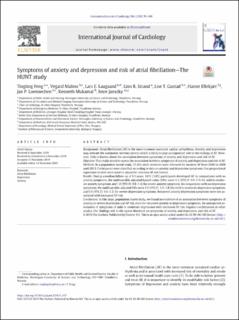Symptoms of anxiety and depression and risk of atrial fibrillation-the HUNT study
Feng, Tingting; Malmo, Vegard; Laugsand, Lars Erik; Strand, Linn B; Gustad, Lise; Ellekjær, Hanne; Loennechen, Jan Pål; Mukamal, Kenneth; Janszky, Imre
Peer reviewed, Journal article
Published version

Åpne
Permanent lenke
https://hdl.handle.net/11250/2673790Utgivelsesdato
2019Metadata
Vis full innførselSamlinger
Sammendrag
Background
Atrial fibrillation (AF) is the most common sustained cardiac arrhythmia. Anxiety and depression may activate the autonomic nervous system which is likely to play an important role in the etiology of AF. However, little is known about the association between symptoms of anxiety and depression and risk of AF.
Objective
This study aimed to assess the association between symptoms of anxiety and depression and risk of AF.
Methods
In a population-based study, 37,402 adult residents were followed for incident AF from 2006 to 2008 until 2015. Participants were classified according to data on anxiety and depression symptoms. Cox proportional regression models were used to adjust for common AF risk factors.
Results
During a median follow-up of 8.1 years, 1433 (3.8%) participants developed AF. In comparisons with no anxiety symptoms, the multivariable-adjusted hazard ratios (HRs) were 1.1 (95% CI: 0.9–1.5) for mild to moderate anxiety symptoms and 1.0 (95% CI: 0.8–1.4) for severe anxiety symptoms. In comparisons with no depression symptoms, the multivariable-adjusted HRs were 1.5 (95% CI: 1.2–1.8) for mild to moderate depression symptoms and 0.9 (95% CI: 0.6–1.3) for severe depression symptoms. Recurrent anxiety/depression symptoms were not associated with increased AF risk.
Conclusions
In this large, population-based study, we found no evidence of an association between symptoms of anxiety or severe depression and AF risk, even for recurrent anxiety or depression symptoms. An unexpected association of symptoms of mild to moderate depression with increased AF risk requires confirmation in other studies. Our findings add to the sparse literature on symptoms of anxiety and depression and risk of AF.
